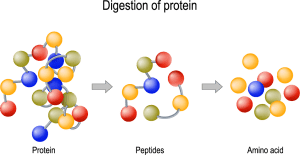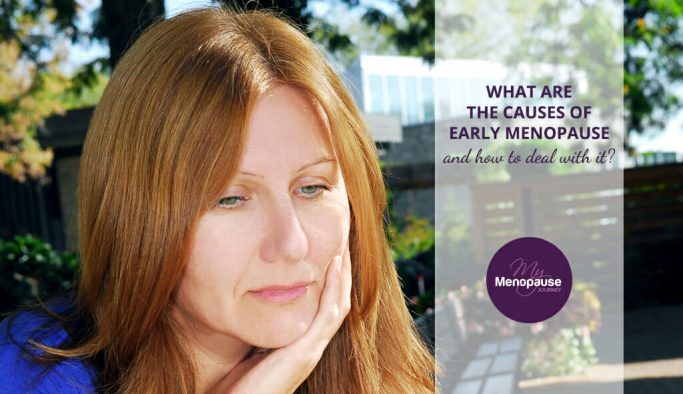Did you know that our body is literally made of protein?
Yes, quite all of it — from your bones to your muscles, arteries, veins, skin, hair and nails! Your internal organs are also built by tissues made of protein. Oh, just imagine other nutrients in your body bumping into protein wherever they go.
Protein is truly an essential nutrient to support your body systems and overall health in midlife! But how much of such a vital nutrient do we need in menopause?
Midlife women should aim for at least 30-40 grams of protein per meal. This recommendation is more than the “standard” dietary guidelines for protein but is essential for aging women — to maintain muscle mass, keep a healthy weight and optimize overall health!
Let’s talk more about that in this article and uncover the health benefits of protein, the symptoms of protein deficiency and the best protein sources to go for!


Table of Contents
Protein: Its Powerful Benefits for Menopausal Women
Protein plays many roles in our body processes. And when I say “many”, believe me… It’s REALLY many!
► It promotes satiety and better hunger signals.
► It facilitates and enhances cellular function.
► It is a precursor to amino acids.
► It is essential for muscle mass and movement.
► It helps repair and build tissues.
► It maintains the health of our bones, teeth, hair and nails.
► It transports oxygen throughout our body and metabolizes essential nutrients.
► It reduces the risk of heart-related problems.
Protein is like a slow-moving guest in your stomach. It takes time to leave, unlike other foods that rush out. Because it stays longer, you feel full for an extended period!
When you eat protein, it also sends a message to your brain through a special messenger called “leptin”. This hormone tells your brain, “Hey, we’re pretty full down here — no need for more food right now”! At the same time, protein tells your hunger hormone “ghrelin” to keep quiet. All this internal conversation helps you feel satisfied and not think about snacking all the time!
Moreover, protein is made up of amino acids, which are essential for the construction and repair of cells. They are necessary for keeping your cells “well-built” — ensuring that your body functions efficiently at a cellular level. These amino acids also serve as food for our cells!
When you eat, the enzymes in your digestive system break down protein into smaller peptide chains. Then, the peptide chains are broken down into individual amino acids. Finally, the amino acids are absorbed into the bloodstream for their specific duties!


There’s also a reason why protein is popular among fitness enthusiasts. This nutrient plays a pivotal role in repairing tissues and muscles!
When you engage in physical activity, especially those that are intense or involve strength training, microscopic damage occurs in the muscle fibers. While this wear-and-tear damage is necessary for muscle strengthening, it is important to support your body with protein!
Consuming good proteins can counteract the weakness and fragility of our bones and muscles, especially as we age — when our muscle mass and bone mass decline naturally!
Here are the other significant roles of protein for women in menopause:
- Protein comprises the structure of our bones, cartilage, muscles, skin and blood.
- It keeps our teeth, hair and nails healthy.
- “Hormonal proteins” are messenger proteins that coordinate some of our bodily functions. Examples of hormonal proteins are insulin, oxytocin and somatotropin.
- Hemoglobin is a protein that transports oxygen and essential nutrients throughout our body. It is also utilized by the immune system and helps defend the body against diseases.
- “Protein enzymes” help digest our food, synthesize essential substances and break down waste products for elimination.
- “Storage proteins” reserve amino acids for the body until ready for use.
- Proteins are directly involved in expressing our genetic codes. The gene’s DNA sequence serves as a template for protein synthesis and, in turn, determines the protein’s structure and function.
- It promotes longevity and a better quality of life.
- It reduces the risk of atrial fibrillation and chronic metabolic diseases.
What is the Recommended Protein Intake in Menopause?
Aiming for at least 30-40 grams of protein per meal is ideal for midlife women. While this range is more than what is normally recommended, it is especially important for the needs of aging women. Consuming 30-40 grams of protein provides the body with enough building blocks to maintain muscle mass, keep a healthy weight and optimize overall health in menopause!
According to Harvard Medical School, the recommended dietary allowance (RDA) for protein is 0.8 grams per kilogram of your body weight.
But more recent studies have concluded that consuming up to twice the RDA of protein is safe and necessary, especially for aging women. The ideal protein consumption may vary as well depending on age, gender and activity level.
The Dietary Guidelines for Americans also emphasize the importance of “eating healthier protein-rich foods rather than concentrating on specific amounts of daily protein.”
Additionally, studies suggest that protein is more effective if you space it out over the whole day, rather than loading it up in one meal.
Why Is It Vital to Consume Enough Protein While Aging?
There’s a process called “protein synthesis”, which is how your body uses protein to build and repair tissues.
Yes, protein quality and quantity become a different story when we age! We don’t eat protein just to get the energy and nutrients it provides. We need to meet a minimum amount of protein from good sources — to fight the natural, age-related decline in our muscles!
That’s why experts recommend eating around 30-40 grams of protein per meal. This range is ideal for maximizing the rate of protein synthesis!
As mentioned, protein breaks down into amino acids — and your body needs a certain amount of these amino acids to initiate protein synthesis. Eating less than 30 grams of protein might not provide enough, especially if you lack “leucine”, which plays a big role in starting the process.
So, choose a wide variety of protein-rich foods and combine them effectively! Identify how much protein you need, then get familiar with different sources and their protein values. Once you know the facts, making the right choices is as easy as A-B-C!
Something to remember about “leucine” and other branch-chain amino acids…
Metabolic health expert Dr. Lustig highlights that even though leucine is crucial for protein synthesis and muscle building, too much of it can lead to insulin resistance if you live a sedentary lifestyle.
Leucine is a type of amino acid that your body uses to help build muscle. But if you take too much leucine without exercising, your body doesn’t store it in your muscles (like it would with extra glucose or fat). Instead, the extra leucine goes to your liver and gets broken down.
If this happens often, your liver can turn the leftover parts of leucine into sugar and fat. This is how extra leucine (without exercise) leads to weight gain! Over time, excess weight can make it harder for you to use insulin properly — a condition known as insulin resistance (IR).
Why is insulin resistance a problem? Well, having IR means the cells in your muscles, fat and liver don’t respond well to insulin. In turn, your body can’t easily take up glucose, so the pancreas produces more insulin — an attempt to help glucose enter the cells. This condition can eventually lead to elevated blood glucose levels and, if unmanaged, could progress to type 2 diabetes.
Thus, it is super vital to balance out leucine consumption with enough physical activity! This is to ensure you can maintain optimal metabolic health and avoid potential health issues, like insulin resistance.
How Would I Know If I Lack Protein?
Good question! In menopause, protein deficiency can mainly manifest through:
- Increased appetite and cravings
- Hair loss
- Brain fog
- Mood swings
- Poor skin health
- Loss of muscle mass
- Slow metabolism
- Decreased immunity
- Having low energy and experiencing fatigue
- Weakening of the heart and respiratory system
Prevent protein deficiency by going for the best protein sources waiting to be discovered below!
10+ Healthy and Natural Protein-Rich Sources
Grass-fed meat, organic chicken breast, liver, fish, eggs, vegetables, fermented food, beans, lentils, nuts and seeds are some of the best protein-rich sources you can go for!
When we eat foods for protein, we also eat every nutrient that comes with it. It’s the “protein package” that’s likely to make a positive difference in your health!
So, go for natural protein sources as much as possible. Many of us may think we only need to eat meat to get enough protein, but there’s also an array of plant-based options for good variation! ????
Dr. Josh Axe, a certified Doctor of Natural Medicine and Clinical Nutritionist, recommends the following protein sources:
1 → Vegetables
- Spinach (0.7 g/1 cup)
- Kale (0.6 g/1 cup)
- Bok Choy (1.05 g/1 cup)
- Asparagus (3 g/1 cup)
- Mustard Greens (1.6 g/1 cup)
- Collard Greens (1.1 g/1 cup)
- Brussel Sprouts (3 g/1 cup)
2 → Fish
- Wild-Caught Salmon (17 g/3 oz.)
- Sardines (22 g/4 oz.)
3 → Egg (7 g/1 large egg)
4 → Fermented Food
- Kefir (10 g/1 cup)
- Tempeh (15 g/3 oz.)
- Natto (15 g/0.5 cup)
5 → Beans
- Black Beans (15 g/1 cup)
- White Beans (17 g/1 cup)
6 → Lentils (18 g/1 cup)
7 → Almonds and Other Healthy Nuts (5 g/0.25 cup)
8 → Hemp Seeds (9 g/1 oz.)
9 → Grass-Fed Meat (22 g/3 oz.)
10 → Organic Chicken Breast (21 g/3 oz.)
11 → Liver (7 g/1 oz.)
There will always be different camps on the topics of health and nutrition. When it comes to protein, some say we need to get it from animal sources, while others advocate for plant-based proteins. Personally, I lean towards variation.
Animal proteins are considered complete proteins — providing all the essential amino acids in one package. On the other hand, plant proteins may require consuming a larger variety, but they are also excellent sources of protein and other beneficial nutrients!
So, why not mix and match when we can, right?
Healthy Protein Recipes for Muscle Strength, Better Energy & Optimal Health!
Ready to embark on a flavorful journey that’s tantalizing to your taste buds AND gives you a nutritional boost? Revolutionize your meals with these healthy protein recipes!
► High-Protein Foods: From a wild-caught salmon to a cup of Greek yogurt and a slice of grass-fed meat, this video will walk you through high-quality and versatile sources for your protein needs!
► High-Protein Salads: Salads made only from greens, cucumber and tomatoes are so outdated. You can definitely make it more delicious with other healthy ingredients! This is the reason why I just can’t get enough salads!
Protein Powders: Do They Work as Good as Natural Protein Sources?
Without a doubt, nothing can replace natural food sources for your protein needs. But I can’t blame you if the growing trend on protein powders is leaving you curious! Protein powders are enjoyed mainly by fitness enthusiasts, especially gym-goers, bodybuilders and athletes!
Can midlife women also take it?
OF COURSE! If you are always on the go and need a quick nutrient boost, let protein powder do the work!
Protein powder provides a nutritional boost that helps you stay full longer. A protein-rich drink made of greens, berries and protein powder helps curb your appetite later in the day!
Now, to make sure you are going for the best choice, always read the labels attentively!
Here are some key factors to consider when choosing a protein powder:
- Go for the one with the fewest ingredients
- Low in carbs and sugar content
- No artificial ingredients added
- Dairy-free and gluten-free
- Organic or non-GMO
- Easy to mix and clump-free
Choosing a protein powder high in leucine is also beneficial, especially if you’re looking to support muscle building and repair. As mentioned before, leucine is a crucial amino acid for initiating protein synthesis!
Collagen and Protein: Are they the same?
Well, collagen is a type of protein, but it is not just “some” type of protein. Why?
About one-third of all protein present in our body consists of collagen.
YUP! It is like a “glue” that holds our entire body together!
Collagen is responsible for the elasticity and structure of our skin — keeping it firm and smooth. No wonder it’s a popular ingredient in skin and facial products!
Collagen also increases the skin’s moisture balance, which maintains hydration and gives us better resistance to environmental toxins.
But other than being your skin care bestie, collagen has got MORE to give for your health! It promotes:
- Stronger teeth
- Detox for a healthier liver
- Improved bone mineral density
- Reduced pain and stiffness in joints
- Helps heal damaged intestines and stomach
- Enhances metabolism and muscle growth
- Helps with weight loss
Collagen can be taken from natural food sources, supplements or powders.
Visit my article to get a full list of healthy collagen sources! ▼
Protein, Exercise and Fasting: My Personal Experience
Looking at studies and listening to experts made me realize something:
My protein intake has been less than the minimum amount that my body needs.
I normally work out in the morning and eat my first meal at noon. This routine has worked really well for me for 15 years! But now that I’m over 60, I notice that I feel tired and a bit low on energy after exercise.
I took these as “signals” from my body that something was missing in my routine.
So, I started drinking a protein/collagen shake after my morning workout and (drumroll, please)…
I FEEL SO MUCH BETTER! I don’t have energy crashes anymore!
Some of you might ask:
“How do you feel energized if you’re not eating something first before exercising?”
According to studies, exercising in a fasted state promotes the use of fat as an energy source. In other words, your body naturally taps into the “fat-burning” mode instead of being in “sugar-burning” mode — where your body relies on glucose (from carbs) for fuel.
Fasted exercise can also improve blood sugar levels and insulin sensitivity, which both play a role in keeping your hunger signals optimal!
So yes, even though I eat my first meal at noon, my protein shake is enough to fuel my body after a workout.
You see, many people don’t realize the loophole in the “diet rule” that “you have to eat your breakfast early in the morning before anything else.”
I say, it’s not about how early or late you eat — it’s about the NUTRIENTS you give your body!
“Well, is it safe to work out in the morning and eat your first meal later?”
It is generally safe to work out and have your meal later. But make sure you are properly hydrated before and during exercise! Also, be mindful of the type of exercise you do. Your morning workout should make you feel good and energized (not exhausted)!
I still practice fasting today, but I have adapted to a more flexible lifestyle. Instead of following a strict daily routine, I tune in more attentively to my body’s needs!
When I feel like I have enough energy, I go for strength training and high-intensity exercises. But during days that I need more calmness and inner balance, I go for yoga, Pilates and Qigong.
This “listen to your body” perspective is where I anchor my newly launched course!
It highlights different fasting protocols proven safe and effective for women.
As a nutrition coach and fasting therapist, I can talk for hours about how good fasting can be. But I also know it’s not easy to find that sweet spot and build the right habits — where you can get the results you are after.
So, if you are interested in the fasting lifestyle, let me do the work with you and check out my course, FAST.EAT.THRIVE!™.


Takeaway
As we move through menopause, providing our body with the right fuel matters significantly. Strive to be aware of the essential nutrients you need and the best sources to get them from!
You can try loading up on protein for a week or two and observe how you feel. (For me, it was a game-changer!) To make things even better, incorporate some resistance exercises to improve muscle mass and bone strength!
With its countless benefits, protein is truly a powerful aid to optimize your overall health in midlife.
References:
drhyman.com/blog/2019/07/09/protein-and-your-health-what-you-need-to-know/
draxe.com/nutrition/protein-foods/
mymenopausetransformation.com/heart-health/palpitations-during-menopause-and-the-nutrients-your-heart-needs-as-you-age/?inf_contact_key=4e3238bab83889e8fa5732ae990261a9cc0558ed5d4c28cbfab114022b1ec50d
avogel.co.uk/health/menopause/videos/how-much-protein-do-we-really-need-during-menopause/
menopausecentre.com.au/information-centre/articles/the-power-of-protein-more-so-during-perimenopause-and-menopause/
academic.oup.com/advances/article/10/Supplement_4/S340/5624067
bluezones.com/2016/04/fasting-for-longevity/
researchgate.net/profile/Mathieu-Maltais/publication/40042376_Changes_in_muscle_mass_and_strength_after_menopause/links/55b8b72908aed621de06eb64/Changes-in-muscle-mass-and-strength-after-menopause.pdf
ncbi.nlm.nih.gov/pmc/articles/PMC4433492/
todaysdietitian.com/newarchives/030314p30.shtml
womenshealthmag.com/food/a19933070/protein-deficiency-signs/
draxe.com/nutrition/protein-deficiency/
thoughtco.com/protein-function-373550
westonaprice.org/health-topics/abcs-of-nutrition/protein-building-blocks-of-the-body/
hsph.harvard.edu/nutritionsource/what-should-you-eat/protein/
pubmed.ncbi.nlm.nih.gov/19699838/
health.gov/our-work/food-nutrition/previous-dietary-guidelines/2015
medicalnewstoday.com/articles/318600
health.harvard.edu/blog/how-much-protein-do-you-need-every-day-201506188096
pressbooks-dev.oer.hawaii.edu/humannutrition/chapter/protein-digestion-and-absorption/
ncbi.nlm.nih.gov/pmc/articles/PMC3955043/
nih.gov/news-events/nih-research-matters/protein-consumption-linked-longevity
https://www.acc.org/about-acc/press-releases/2020/03/19/09/47/eating-more-protein-could-help-ward-off-atrial-fibrillation-in-women
frontiersin.org/articles/10.3389/fnut.2022.866400/full
nature.com/scitable/topicpage/protein-structure-14122136/
chriskresser.com/how-protein-supports-your-muscle-health-with-dr-gabrielle-lyon/
sciencedirect.com/science/article/pii/S1525861013003265
sciencedirect.com/science/article/pii/S0002916522005986
ncbi.nlm.nih.gov/pmc/articles/PMC6983467/
levelshealth.com/blog/what-effect-does-fasted-exercise-have-on-metabolism
levelshealth.com/podcasts/209-what-is-insulin-resistance-and-why-does-it-matter-dr-rob-lustig-dr-dominic-dagostino
👉 What to Do Next
Don’t go just yet — especially if you’ve been feeling off and no one’s given you real answers.
Go to the START HERE page.
It’s where things begin to feel clearer. No more second-guessing, no more sorting through conflicting advice. Just calm, honest support for where you are right now.
And if you haven’t yet, download the FREE GUIDE.
It’s quick, clear, and made to help you feel better — without having to turn your whole life upside down.


Gita is the founder of My Menopause Journey. Since 2014, she has been supporting midlife women by sharing hard-earned learnings from her own experience. To advance her knowledge, Gita puts a lot of her time and effort into understanding the broad spectrum of women’s health. She immerses in extensive research about the physical, mental and emotional aspects of menopause. Gita believes in the life-changing power of healthy, holistic living — this is where she anchors her message to all women. Learn more about her marvelous mission in About us - My Menopause Journey.







“Moreover, studies suggest that protein is more effective if you space it out over the whole day, rather than loading up in one meal!”
What studies?? Meaning WHAT studies have been done in menopausal aged women that shows a steady dosing of protein throughout the day is better than 3 or 4 meals with 30 – 50 grams of protein being consumed at one time? This amount is necessary post-menopause due to the fact that we can not synthesize protein like we could in our younger years. Sarcopenia happens as we age EVEN if we are lifting weights, hence the need for bolus dosing protein. Anything less doesn’t get us the 2.5 to 3g of leucine we need to actually synthesize the protein to lay down muscle.
I’d love to see what studies there are about menopausal women and protein. Thank you for your help!! 😉
Hello Kelly, thank you for your comment!
I agree that a certain amount of protein is necessary for postmenopause. However, there are several reasons why public health organizations have shifted away from “fixed” percentages of protein, fats and carbohydrates.
Protein needs can vary depending on an individual’s baseline activity level, body mass, hormone levels, etc. The (1) quality of the protein, the (2) density of the protein in the food source and the (3) non-protein components of the protein food source must also be taken into account. Link: pubmed.ncbi.nlm.nih.gov/29233589/
For these reasons, the Dietary Guidelines for Americans emphasize the importance of “eating healthier protein-rich foods rather than concentrating on specific amounts of daily protein.” Link: health.gov/sites/default/files/2019-09/2015-2020_Dietary_Guidelines.pdf
The Harvard School of Public Health also supports this claim saying: “It’s the source of protein (or, the protein “package”), rather than the amount of protein, that likely makes a difference for our health.” hsph.harvard.edu/nutritionsource/what-should-you-eat/protein/#how-much-need
Moreover, this full article suggests that adding protein throughout the day does not only hold hunger pangs at bay (so that dieters lose more weight); It also keeps body composition (the amount of fat relative to muscle) in better proportion. But again, it will still depend on a woman’s individual needs. academic.oup.com/biomedgerontology/article/66A/11/1218/633335?searchresult=1
Here are more studies showing why there’s no one-size-fits-all dose of protein for all women in menopause:
Adequate dietary protein is associated with better physical performance among postmenopausal women 60-90 years: pubmed.ncbi.nlm.nih.gov/24522467/
Protein intake in community-dwelling postmenopausal women and its relationship with sarcopenia: pubmed.ncbi.nlm.nih.gov/34666497/
Changes in muscle mass and strength after menopause: pubmed.ncbi.nlm.nih.gov/19949277/
Furthermore, here are journal articles explaining how different kinds of physical activities affect protein synthesis:
A critical examination of dietary protein requirements, benefits, and excesses in athletes: pubmed.ncbi.nlm.nih.gov/18577776/
How much protein can the body use in a single meal for muscle-building? Implications for daily protein distribution: jissn.biomedcentral.com/articles/10.1186/s12970-018-0215-1
I hope you find these sources good, Kelly! Thank you for reaching out. 💜
— Gita
All the listings you have that equal 100g of protein are off, yes? Those all should be 10g or less. One egg is around 6g of protein.
Hi Raz,
Thanks for notifying us!
The values are corrected now.
We have to blame “error code 60” for this (The problem was sitting 60 cm from the computer screen 😉 )
All the best 😘
Gita
Consider revising this article. First, the idea of “complete” and “incomplete” protein is now passe. Nutrition experts have realized that as long as you’re eating a variety of foods throughout the day that provide the amino acids, vegans don’t have to worry about combining plant proteins. Also, in your list of how many grams of protein that are in different foods, you say that 28 grams of nuts/seeds provides 100 grams of protein??? Mathematically impossible! It’s more like 8 grams.
Hi Emily,
Thank you for the information. We will definitely update the article with this idea in mind.
All the best,
Gita
I don’t understand why you are pushing protein powder, surely you should be encouraging people to eat real non processed food. I know I would prefer a big salad packed with chicken, ham, cheese and eggs than a protein shake.
Hi Linda,
We couldn’t agree more that healthy food sources should be our number one source of protein.
However, in some specific diets, it can be hard to get enough protein, so a boost may be necessary with the use of protein powders.
All the best,
Gita